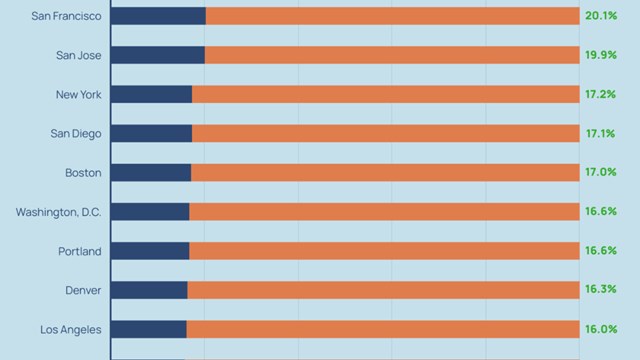
The main source of any condo or co-op’s revenue comes from monthly maintenance fees. That seems self-evident.
But sometimes a building or development may suddenly need to undergo emergency repairs or fund large capital improvement projects, and the board may be reluctant to once again raise maintenance fees, especially if the co-op or condo is a middle-income or low-income one. The building may then seek to come up with other, creative ways to increase their cash flow, build up their reserve fund and stay solvent.
Common Approaches
One of the most visible ways to raise revenue for your HOA may be to rent out your rooftop to a cell phone company for cell phone antennas. This, indeed, could be a bonanza for residential buildings, whether they are co-op, condo or rental. Especially in the early 2000s, they seemed to be going up everywhere. Today, there may be fewer such opportunities because there are fewer cell phone companies but when they do exist they can be lucrative.
Both cell phone antennas and an older type of use of exterior space—advertising signs, in other words—are controversial, and it can be difficult to obtain membership’s approval if required by the governing documents, says attorney Hubert Cutolo of the Hubert Cutolo Law Firm in Manalapan. Aesthetic appearances are, of course, one of the reasons owners may object to having billboards or other signage attached to the exterior of HOA buildings.
On the other hand, says shareholder attorney David Byrne with the law firm of Stark & Stark in Lawrenceville, “If counsel is involved in the review, negotiation and execution of the relevant lease and/or agreement, the building’s rights can be sufficiently protected.”
The experts we asked about ways of creative financing for this article all had many good suggestions.
For example, Cutolo says that an association with a clubhouse (or a similar large, indoor meeting area) can generate revenue by renting out the space, although those who wish to do so should consult their attorneys and their governing documents to determine what types of activities and functions can take place at the clubhouse.
“Similarly,” he says, “an association should consult its governing documents to determine whether renting out exterior common elements [such as tennis courts] is permissible.” In addition, he mentions that some publishers are willing to print a condo association’s newsletter at little or no cost to the association, “provided that they are allowed to share in the revenue generated by advertisements within the newsletter.”
Karen Sackstein, a CPA with her own firm in Fair Lawn, mentions some widely used strategies: laundry-room commissions, storage locker income, the aforementioned billboard advertising and vending machine commissions, among others. “Given the popularity of New Jersey reality shows, we have even seen income generated for use of the property for filming,” she says.
And Byrne says he has clients who have leased the use of their servicemarks (similar to logos) to local realtors, and has a client that has leased parking spaces to neighboring businesses.
Cost Reduction & Financial Means
Physical means, like use of roofs, parking lots, laundry rooms and so on, aren’t the only supplementary ways that developments can increase their revenue. Others involved reducing costs, or financial methods.
For example, says Sackstein, “A real estate tax appeal is often an overlooked source for cost savings. However, this would only apply to a cooperative housing corporation, since condominium owners are individually responsible for the real estate tax on their unit.”
Bill Cirkus, CEO of Community Management Corporation in Clifton, says that “insurance costs can vary widely, if not handled properly, and master contracts for common electricity and gas, if a common meter, can save tens of thousands of dollars.”
And Byrne says that both condos and co-ops should consider whether they are entitled to “additional reimbursements and/or services with respect to New Jersey’s Municipal Services Act.” The Municipal Services Act states that a municipality must either provide certain services to a private community or reimburse that particular private community the cost of those services, including snow removal, collection of trash or recyclables, and the lighting of roads.
Now, we’ve heard some of the possibilities for alternative, or supplementary, financing for co-ops and condos. What resources about alternative financing are available to a board of a building that doesn’t have the services of a professional manager?
The board members can read periodicals, go to trade shows and seminars, search the Internet for relevant material and join organizations like the extremely well-respected Community Associations Institute of New Jersey (CAI-NJ). They can, of course, also subscribe to The New Jersey Cooperator.
Sackstein says that seeking out other board members in the area could prove valuable. And in a similar vein, Byrne says that professionals such as attorneys, accountants, engineers, insurance brokers and engineers can also serve as a resource by sharing their experiences with other clients.
What about Smaller Buildings?
If your co-op or condo building is small—say, 10 or 12 units—many space-related ways of alternative financing can be more difficult for you. Any of these buildings don’t have the resources or the space that larger ones do.
In these cases, one of your best bets may be the roof.
Cutolo mentions a rooftop terrace as one of the common elements that a small association can still rent out. Again, the board should consult its governing documents, attorney and insurance policies. And of course, the aforementioned cellular towers are also a rooftop item.
Even a roof garden or “green roof,” while not directly increasing income to the board, can help save energy bills for individual owners and may also increase a unit’s resale value.
Boards and Managers
To increase a building’s cash flow, boards and managers must work together to ensure financial stability. The association has the ultimate responsibility, but the manager often has the experience and professional know-how. Managers have their ears to the ground, they know about taxes, they know about the price of oil, they know about expenses going up in general.
The best way to make sure boards and management can work together, says Cirkus, is to create a well-thought-out and realistic budget together before the beginning of the fiscal year— and to stay within that budget during the year.
“Sometimes it’s not possible to predict a bad snow season, a spike in utility costs and unforeseen repairs,” he says. “But by and large, if the goal is to be as close to the budget as is reasonably possible, the association should be able to stay out of trouble.”
In addition, reserve studies should be updated every three to five years by a licensed engineer to take a fresh look to see if the reserve component of the budget needs to be adjusted.
“If there are collection issues,” adds Sackstein, “a formal collection plan and timely response are imperative to improving the odds of full receipt of owner balances’ due.” On the same subject, Cutolo says that because of today’s economic situation, “boards may wish to accept payment plans in lower amounts than previously entertained in order to ensure that the delinquent member begins paying the ongoing monthly assessment again and `chips away’ at the outstanding balance.”
While managers can help the board, in the long run, the board has the ultimate financial responsibility. The manager or management company can only make suggestions. Still, it’s in management’s best interest to use its expertise to provide the board with the best possible advice—ditto for other experts, such as attorneys, accountants and engineers.
“Management must always be focused, and rightly so, on maintaining its relationship and keeping its clients,” says Byrne. “Obviously, a condominium and/or co-op that is financially better off after the client engages that manager is more likely to have a positive feeling about that manager/management company.”
“Management can assist with the preparation of the budget,” adds Cutolo, “by preparing accurate financials and advising the board accordingly. Management can also be involved by ensuring that repairs and maintenance of the association are properly sent out to competitive bid and remaining vigilant in the collections process.”
Echoes of Old 80-20 Rule
One item we haven’t mentioned that is working in co-ops’ favor (and this pertains only to co-ops, not for condo developments, which are more common in this state) is a piece of legislation passed several years ago, the Mortgage Forgiveness Debt Relief Act of 2007, sponsored by Congressman Charles Rangel. The measure allowed co-ops to determine commercial rents without the fear that the additional income would disqualify owners from deducting their proportionate share of the building’s mortgage interest and taxes.
Under the previous law, known as the “80-20 Act,” co-ops were limited to charging commercial tenants rent that didn’t total more than 20 percent of the building’s total income from rents and/or cooperator maintenance payments.
But now, co-ops are allowed to pass through applicable tax benefits to their owners if even one of the three following requirements is met: if 80 percent or more of the co-op’s gross income comes from the shareholders; if 80 percent of the total square footage of the building is used for residential purposes, or if 90 percent of the costs of operating the building are for the benefit of the shareholders.
This gives many boards more flexibility in renting to higher-paying stores (if they have commercial space), which, of course, brings more income.
Is it ever worth it to forego the tax benefits of staying on the right side of the rule, as it’s currently written, in favor of more money coming in? Sackstein replies: “The owner’s proportionate share of the interest and real estate tax deduction is reported to tenant-shareholders annually on a Form 1098. Loss of this deduction for every shareholder would far outweigh the tax benefit of reduced maintenance fees.”
Do Owners Have a Say?
Do unit owners or shareholders have a say in how their building or development makes money—do they have the right to veto a commercial tenant, or to vote against putting advertising signs on the side of the building, for example?
Each building has its own governing documents and its own bylaws, say experts. “However, cooperative housing governing documents are typically much more stringent than those of condominium associations,” says Sackstein.
In general, once a board is elected, it has a fiduciary responsibility to make decisions on behalf of the owners. The owners have the opportunity to make their opinions known and to choose board members at the annual meeting.
All in all, in making decisions or executing agreements involving ancillary or secondary ways of raising revenue for a co-op or condo building, it’s imperative to seek the expertise of your manager, your attorney and your accountant.
Raanan Geberer is a freelance writer and editor based in New York City and a frequent contributor to The New Jersey Cooperator.






Leave a Comment